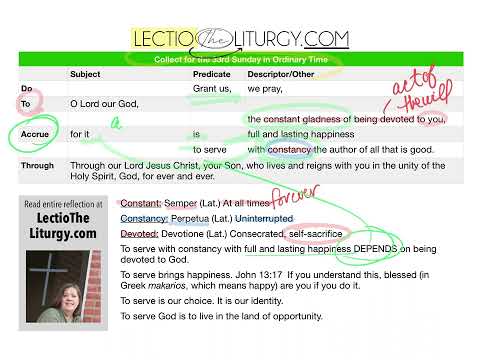Collect 33rd Sunday in Ordinary Time
Thanks for praying with me as we Lectio the Liturgy with the Collect for the 33rd Sunday in Ordinary Time.
Do: Grant us, we pray,
To: O Lord our God,
Do: the constant gladness of being devoted to you,
Accrue: for it is full and lasting happiness to serve with constancy the author of all that is good.
Through: Through our Lord Jesus Christ, your Son, who lives and reigns with you in the unity of the Holy Spirit, God, for ever and ever.
I know what you’re thinking. I wondered that, too: just how many different ways can they use the word constant in a prayer? While the word can seem to mean the same thing, upon further study, I found out they are actually different. The distinction between the two words depends on where they are placed in the prayer.
In the To of the prayer, we are asking God to grant us constant gladness. In the Latin form of the prayer, the word used here is semper, and it means at all times or forever. We are asking to be, at all times, rejoicing to be devoted to God.
To be devoted to something doesn’t just happen. It takes an act of the will. It’s the difference between just liking something and being devoted to it. I may like the music of a certain musician, I may like to hear them on my music stream. However, if I were devoted, I would put for the effort to see them in concert. Liking God and being devoted to him follow the same pattern.
In the Accrue of this week’s prayer, we hear that it is full and lasting happiness to serve God with constancy. In the Latin form of the prayer, the word used for constancy is perpetua, meaning uninterrupted. It’s an interesting thought, isn’t it - serving God without interruption? Sometimes it’s so easy to get derailed during the day, perhaps there’s an art to changing those derailments, those interruptions, into an opportunity to turn our attention back go God.
The Accrue of this week’s prayer carries a lot of weight. It is the dependent phrase, which means that having full and lasting happiness serving God is dependent upon the joy of being completely devoted to Him. To serve is to comply with or to be subject to. We know that it will take an act of our will to serve, however, the result is God's promise of happiness if we serve him.
In John 13, we hear how Jesus set out to wash his disciples feet. They complied, except for Peter, who, instead, wanted to serve by washing Jesus’ feet. Jesus tells him that unless He washes, Peter will have no inheritance with him. Peter then asks Jesus for it all, to wash his hands and head as well. Jesus then instructs his disciples that as he has done to them, which no doubt filled him with joy, they should do to others. In verse 17 Jesus tells them that their job is to do what he did, to serve, and if they understand this, blessed are they who do it.
Interestingly, the word blessed used in John 13:17 is makarios, which means happy. Used here, blessed and happy are the same thing. Jesus, in his example of serving, tells us explicitly that if you understand this, happy (or blessed) are you if you do it. Hearing it isn’t enough.
Jesus tells us and this prayer tells us, that full and lasting happiness comes from uninterrupted service to God. The question that I’ve been pondering is, “what does that look like?” and the answer that I found is in the Apostles. <br> What made them happy? How does serving Jesus bring happiness? It starts with identity. Things don’t make us happy. True happiness comes from knowing who we are in Christ. True happiness comes in doing what Christ did - he served.
Serving God is to live in the land of opportunity. It is a life of happiness. There is nothing to get you down, because He promised that his yoke is easy and his burden light. Every day and everywhere you go is filled with opportunities of God wanting to work and wanting to work through you. Those are your opportunities to serve.
Thanks for praying with me,
Julie
